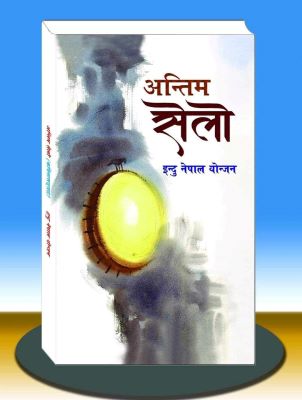
The “Selo” refers to Tamang’s famous melodious folk song to express pains, sorrows and stories
Reviewed by Rupsingh Bhandari
Indu Nepal Yonjan, an enthusiastic poet from the Eastern part of Nepal, belongs to the Tamang ethnic group of Nepal, which is rich in cultures, music and dance. Indu’s debut poetry book “The Final Selo” comprised the bunch of those rich mellow sentiments from his experiences. The “Selo” refers to Tamang’s famous melodious folk song to express pains, sorrows and stories. He symbolically encapsulates all his emotions, imaginations, and reflections of love, life and mankind’s melodies in this beautiful poetry book “The Final Selo”. In fact, those forty poems in Nepali language are the synchronized group dance of his poetic philosophy. He groups those poems in two parts: love and life.

In short, poet punctures the secrets of unsaid Pandora of his living time and circumstances in a modest way uncurtains the realities. He rooms in present and hovers in imaginations keeping underlined his own untold stories and seems drizzling unnoticed through the images, symbols and metaphors beneath the abstract lexicons. Somewhere, he is unsatisfied, and still keeps incubating hope, somewhere, he is depressed, but still stands unshakable in footnotes. In most of his poems; he looks himself stretched, swelled, choked up politically, spiritually, and socially. Meanwhile, one of most important aspect of his poems, readers will be trapped in the love of his languages, deploying the words from the multilingual society poet lines up together with Nepali language as poet lives in the harmonious society, yet alerts the representations, and importance of all of those absolute existences throughout his anthology.
As literature’s highest means is to carry the truth, he seems a fearless truth drunkard depicts without any hesitation. And at the same time balances the mundane. He debunks the cocooned stories of humans and retells the story through poems his ideology of humanity can be traced in the beautiful poem Aaseng in the Border:
Aaseng (Uncle)
Border should not expand
Border should not decrease
Let’s keep border as border
By the geography of border
In the geography of humanity
Let’s never plant the cold.
These beautiful lines, beyond the borders, his deep ideology of humans starkly advocate the poet’s appeal of humanity. Poet concerns the discarded fundamental attributes of humanity and approaches the love of humans beyond all complexity of society.
Poet hopes and imagines the renewal of politics, morality and stability of the society.
At the same time, in another poem he searches for his tribal representation, questions to authority whose mentality of marginalized never changed as Shelly endows poets with grand politically responsible beliefs, “Poet as the prophet of political world.” His mimetic attributes are the fundamental source of his poetry. Consequently, he is able to transcribe and relate the phenomena of contemporary society. Politics which pollutes nameless in their name such rebellion poet transports in to his poetry, he challenges political leaders and invites them into world of creativity for their conscience sanctum in the poem “Yongest Aakhe” he asks leaders:
Come! Let’s sit down somewhere in the corner
And jot down some poems of life
And stitch the unexpressed desires and will of pyramid
Oh! Comrade leave the date expired
Paradoxes.
His frustration, agony, and sarcasm of politics is underlined in many of his poems. From this reality the poet hopes and imagines the renewal of politics, morality and stability of the society.
On the other hand, the poet seems flying back into his past and spills the unexpressed love. He seems a love advocate; many of his poems uncoil the deep unsaid love stories readers easily can relate with themselves. He slithers out from the love’s circumferences and evolves into the love’s guru unhesitatingly tells in the poem “Love”:
We love each other
This no one knows neither you nor me.
These two lines unfold the secret of his love stories. Such a subtle way of writing traps readers into their unsaid love stories. Love is the supreme force for creativity. His poems are not untouched by this universality. As Plato argues, “At the touch of love everyone becomes a poet.” In his anthology readers can find themselves in the poet’s love poems.
Similarly, he contemplates the dichotomy of life. He stirs up his own imagination philosophically and tries to discover, taste and translate into his pen. He manifests his complexity in the poem “Life’s Bird”:
My life’s bird must be in my hand
Therefore, I can fly undisturbed
Farther than myself that I have known me
Far beyond the horizons
Far beyond all humans’ made rigidities.
He makes strong conviction, promises in the absorbed life’s circumstances and questions himself to be free as a bird and kiss the untouched experiences beyond all the human made barriers. He wants to submerge into the cosmos as it is. As Romantic poets Wordsworth and Keats dismiss all the presupposed reality and imagine themselves as the part of nature. He also wants to escape and decamp into the unknown and celebrate himself.
As the poet, professionally works in the health sector, he must have witnessed: myriads of diseases, difficulties, deaths and suffering of health workers. Which bitterly must have scorched his heart. The same connoted theme pours in the poem “Mother and the Pure White Flower”:
I love the white flower
Bloomed in my backward
My mother and the white flower are same
That’s why, I may be obsessed with white
Because my mother is nurse
And always wears a white uniform.
This is an imagination of a child who sees her mother and the white flower; this is an extended metaphor throughout the poem. The poet delivers the hidden pains of health worker during pandemic. He versifies all his endeavors, experiences and emotions from every corner of life as he encounters in his life.
Beside this, there are some limitations in this poetry book The Final Selo, some of the poems seem too short, and some poems seem more abstract. Poet can improve his inner rhythm of poem. More importantly these beautiful poems are freshly stepped in his poetic voyage. He will surely grow his poetic journey more powerfully; this indication can be found in this anthology.
In conclusion, he flows between the complex abstract and the mere reality, his lexicon revolts silently on all the evils of society, marginalized voices and searches for equilibrium among all participants. Thus, this serene anthology bundles as the manifesto of his contemporary world’s love, life and humankind’s manifoldness. He simply demystifies the untold reality in poetic sensibility; his desires represent the righteousness, equality and reverberations of the contemporary world. This beautiful book published by Sahitya Kala Sanskriti Pratisthan, Dharan, is available online throughout the world and all the Nepali readers of the globe can buy it.
I hope, this beautiful poetry book will soon translate into English language for the global readers and I wish his poetic endeavors will contribute to a better nation and the world.
_________
 Rupsingh Bhandari is a poet, short story writer, social activist, critic and translator from the Karnali province of Nepal. He writes in English, Nepali and Hindi. Rupsingh has published several poems, articles, short stories, as well as translated poems and stories. He is the author of the Conscience’s Quantum poetry book. He served as editor of the International Anthology of Pandemic Poetry 2020. His creations are worldwide anthologized and published. He is founder of Words Highway International (Writers Association). Rupsingh does painting and music and loves to travel.
Rupsingh Bhandari is a poet, short story writer, social activist, critic and translator from the Karnali province of Nepal. He writes in English, Nepali and Hindi. Rupsingh has published several poems, articles, short stories, as well as translated poems and stories. He is the author of the Conscience’s Quantum poetry book. He served as editor of the International Anthology of Pandemic Poetry 2020. His creations are worldwide anthologized and published. He is founder of Words Highway International (Writers Association). Rupsingh does painting and music and loves to travel.